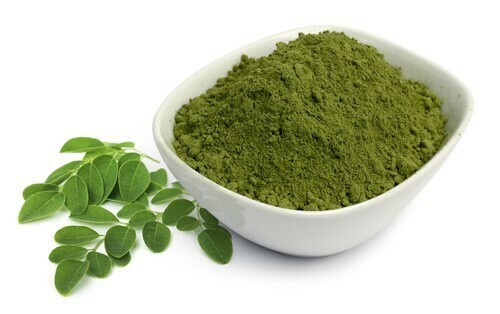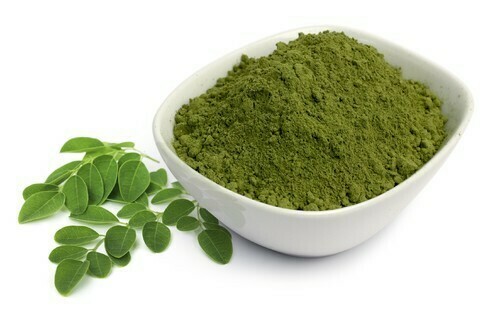Moringa Leaves Powder
Rs. 900.00 Per KG
In stock
Product Details
Moringa is a plant that has been praised for its health benefits for thousands of years. It is very rich in healthy antioxidants and bioactive plant compounds. So far, scientists have only investigated a fraction of the many reputed health benefits.
Moringa trees are fairly the large trees. It goes by a variety of names, such as drumstick tree, horseradish tree or ben oil tree. Almost all parts of the tree are eaten or used as ingredients in traditional herbal medicines. This especially applies to the leaves and pods, which are commonly eaten in some parts of the world. Moringa leaves are an excellent source of many vitamins and minerals. One cup of fresh, chopped leaves (21 grams) contains:
- Protein: 2 grams
- Vitamin B6: 19% of the RDA
- Vitamin C: 12% of the RDA
- Iron: 11% of the RDA
- Riboflavin (B2): 11% of the RDA
- Vitamin A (from beta-carotene): 9% of the RDA
- Magnesium: 8% of the RDA
In Western countries, the dried leaves are sold as dietary supplements, either in powder or capsule form. Compared to the leaves, the pods are generally lower in vitamins and minerals. However, they are exceptionally rich in vitamin C. One cup of fresh, sliced pods (100 grams) contains 157% of your daily requirement. The diet of people in developing nations sometimes lacks vitamins, minerals and protein. In almost countries, Moringa can be an important source of many essential nutrients.
High blood sugar can be a serious health problem. In fact, it’s the main characteristic of diabetes. Over time, high blood sugar levels raise the risk of many serious health problems, including heart disease. For this reason, it’s important to keep your blood sugar within healthy limits. Interestingly, several studies have shown that Moringa may help lower blood sugar levels. However, most of the evidence is based on animal studies. Only a few human-based studies exist, and they’re generally of low quality. One study in 30 women showed that taking 1.5 teaspoons (7 grams) of Moringa leaf powder every day for three months reduced fasting blood sugar levels by 13.5%. Another small study in six people with diabetes found that adding 50 grams of moringa leaves to a meal reduced the rise in blood sugar by 21%
Scientists believe these effects are caused by plant compounds such as isothiocyanates.
Having high cholesterol has been linked to an increased risk of heart disease. Fortunately, many plant foods can effectively reduce cholesterol. These include flaxseeds, oats and almonds. Both animal- and human-based studies have shown that Moringa may have similar cholesterol-lowering effects.
1. Protecting and nourishing skin and hair
2. Treating edema
3. Protecting the liver
4. Preventing and treating cancer
5. Treating stomach complaints
6. Fighting against bacterial diseases
7. Making bones healthier
8. Treating mood disorders
9. Protecting the cardiovascular system
10. Helping wounds to heal
11. Treating diabetes
12. Treating asthma
13. Protecting against kidney disorders
14. Reducing high blood pressure
15. Improving eye health
16. Treating anemia and sickle cell disease
Side effects:
1. Anyone considering using Moringa is advised to discuss it with a doctor first.
2. Moringa may possess anti-fertility qualities and is therefore not recommended for pregnant women.
3. There have been very few side effects reported.
4. People should always read the label on the extract and follow dosage instructions.
Risks:
Some of the medications to be particularly aware of are:
- Levothyroxine: Used to combat thyroid problems. Compounds in the moringa leaf may aid the thyroid function, but people should not take it in combination with other thyroid medication.
- Any medications that might be broken down by the liver: Moringa extract may decrease how quickly this happens, which could lead to various side effects or complications.
- Diabetes medications: Diabetes medications are used to lower blood sugar, which moringa also does effectively. It is vital to ensure blood sugar levels do not get too low.
- High blood pressure medication: Moringa has shown to be effective at lowering blood pressure. Taking moringa alongside other drugs that lower blood pressure may result in it becoming too low.
Can it aid weight loss?
Evidence has shown that moringa extract can be effective in reducing and controlling weight gain in mice. Its high vitamin B content helps with smooth and efficient digestion and can assist the body when converting food into energy, as opposed to storing it as fat.
Moringa is thought to:
- reduce weight gain
- help to lower cholesterol and blood pressure
- prevent inflammation
- help the body convert fats into energy
- reduce fatigue and improve energy levels
Moringa Leaves Powder
Display prices in:PKR


